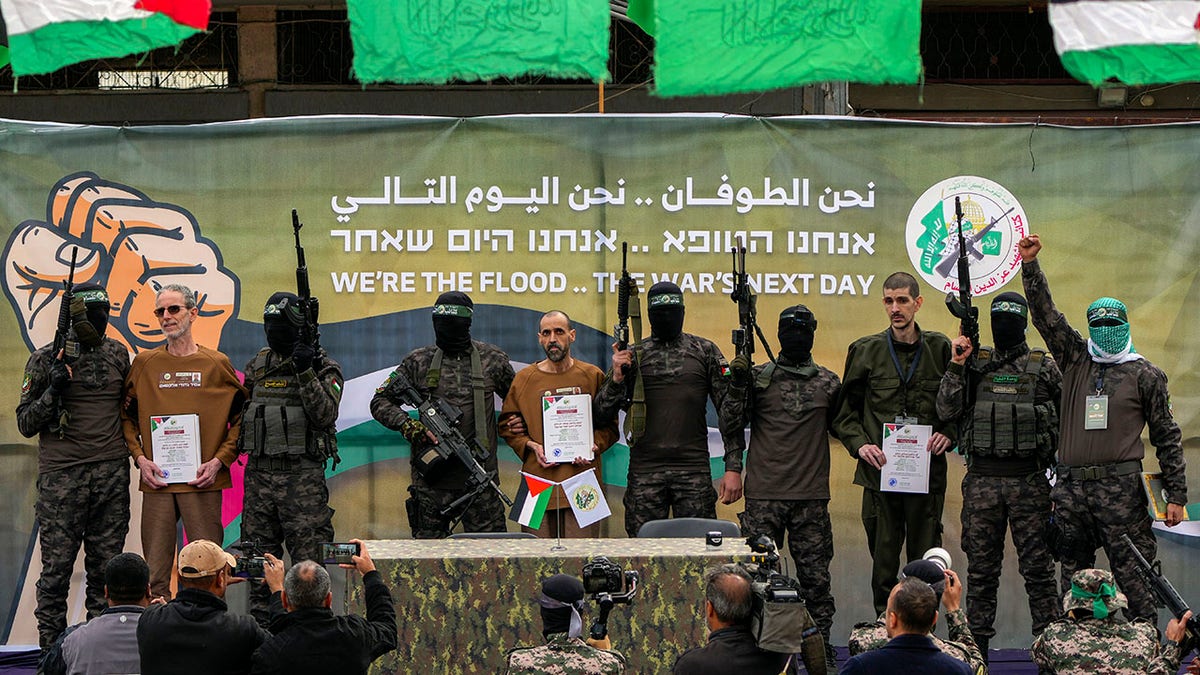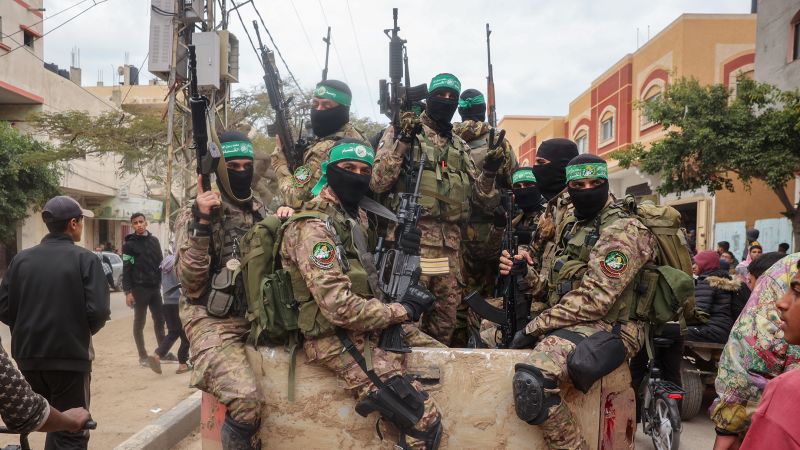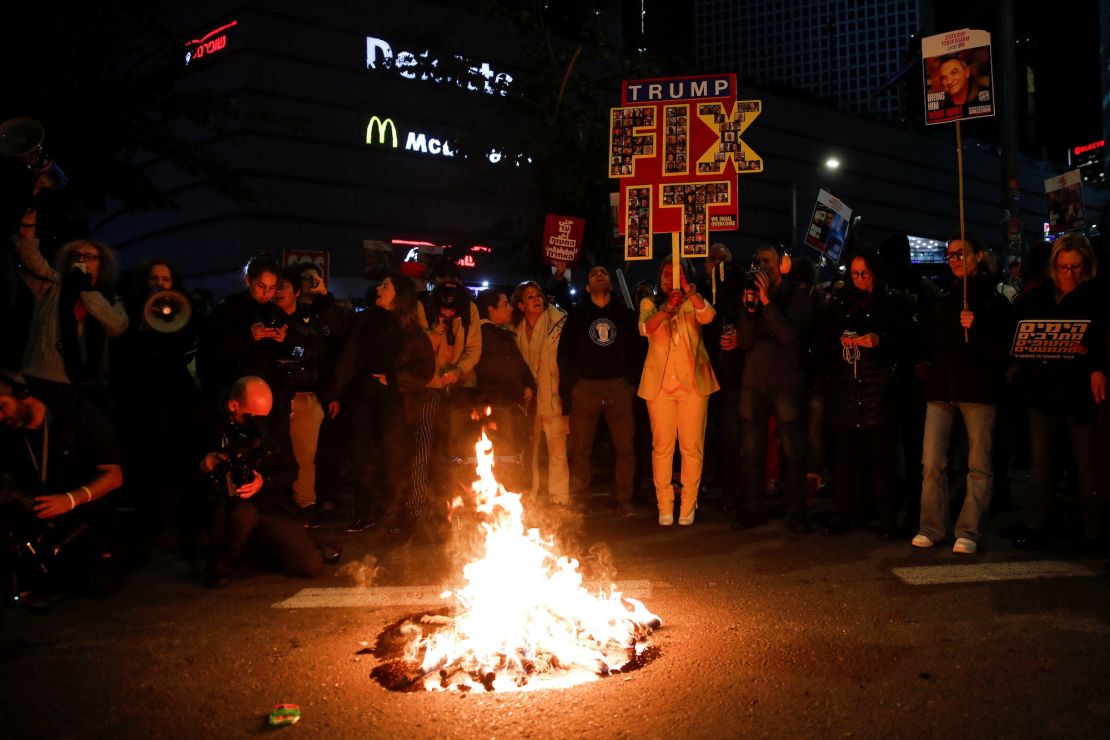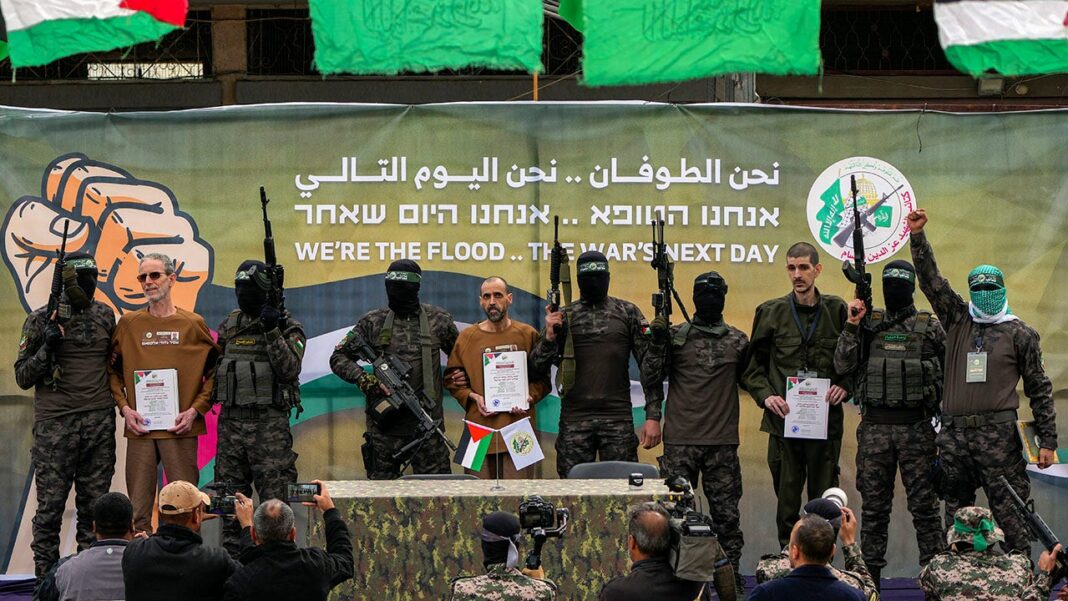Bitter Irony: “Ceasefire” Under Siege as Hamas Delays Hostage Release
In a stark reminder of the fragile nature of Middle East diplomacy, Hamas has announced a shocking delay in the release of Israeli hostages, citing alleged ceasefire violations by Israeli forces. The move comes as a direct challenge to the fragile truce agreement brokered just weeks ago, and raises critical questions about the sustainability of peace in a region plagued by decades of conflict.

As the world holds its breath, waiting for the safe return of innocent civilians, Hamas’s sudden reversal threatens to unravel the delicate balance of power in the region. The implications are far-reaching: will this latest development plunge the region into chaos, or will it serve as a wake-up call for both sides to recommit to the principles of peace?

Hamas Delays Hostage Release Amid Ceasefire Tensions

Hamas has announced a delay in the next scheduled release of hostages from the Gaza Strip, citing alleged ceasefire violations by Israel. The statement, released by Hamas spokesperson Abu Obeida, threatens to postpone the release of three Israeli hostages due on February 15th, 2025, indefinitely. This escalation in tensions comes amidst a fragile six-week ceasefire agreement brokered by international mediators, which stipulated the release of 33 hostages in exchange for nearly 2,000 Palestinian prisoners.
Abu Obeida accused Israel of failing to uphold its end of the agreement, listing specific grievances including delays in allowing displaced Palestinians to return to the northern Gaza Strip, continued shelling and gunfire targeting civilians in various areas, and restrictions on the entry of essential relief supplies, such as tents, prefabricated housing, fuel, and rubble-clearing equipment. According to Hamas, these actions constitute a violation of the ceasefire agreement and a breach of trust.
Israel Denies Allegations, Calls Hamas Move a ‘Violation’
Israel has vehemently denied Hamas’ accusations, characterizing the hostage release delay as a “blatant violation” of the ceasefire agreement. Israeli Defense Minister Israel Katz issued a strong condemnation, stating, “Hamas’ announcement to stop the release of Israeli hostages is a complete violation of the ceasefire agreement and the hostage release deal.” He further instructed the Israeli Defense Forces (IDF) to maintain the highest level of readiness, emphasizing a commitment to preventing a return to the conflict’s previous intensity.
Israeli Prime Minister Benjamin Netanyahu has convened an immediate security assessment, signaling the gravity of the situation. The IDF has subsequently announced the postponement of leave for combat soldiers and the reinforcement of southern Israel to enhance preparedness for potential contingencies. The postponement of a scheduled political-security cabinet meeting to Tuesday morning further demonstrates the Israeli government’s focus on responding to this development.
Consequences of the Delayed Hostage Release
The potential consequences of Hamas’ decision to delay the hostage release are far-reaching and multifaceted, impacting hostages, families, regional stability, and the future of the ceasefire agreement.
Impact on Hostages and Their Families
The psychological and emotional toll on hostages and their families is significant. The uncertainty and prolonged separation amplify anxieties and fears. The Hostages and Missing Families Forum, a volunteer group dedicated to securing the safe return of the hostages, has expressed grave concern, urging mediators to expedite efforts to restore the agreement and ensure the hostages’ safe return.
Statements from released hostages, highlighting the harsh conditions they endured during captivity, further underscore the urgency of the situation. The Forum emphasizes that time is of the essence, calling for immediate action to rescue all remaining hostages from this distressing situation.
Regional and International Reactions
The international community has expressed deep concern over Hamas’ decision and the escalating tensions in Gaza. The United States, the United Nations, and several other countries have called for the immediate restoration of the ceasefire agreement and the release of all remaining hostages. Diplomatic efforts are underway to de-escalate the situation and prevent a further escalation of violence.
The potential for regional instability is a significant concern. This latest development threatens to undermine regional efforts to secure peace and stability in the Middle East.
Implications for the Ceasefire Agreement
The future of the fragile ceasefire agreement hangs in the balance. Hamas’ decision to delay the hostage release further complicates the already delicate peace process. The agreement, painstakingly negotiated by international mediators, relies on mutual trust and adherence to agreed-upon terms. The current impasse raises serious questions about the sustainability of the ceasefire and the prospects for a lasting peace resolution.
The potential collapse of the ceasefire agreement could lead to a resurgence of violence, resulting in further casualties and humanitarian suffering. It could also undermine regional security and stability, with far-reaching consequences for the entire Middle East.
Analysis and Implications of Trump’s Statement
Adding fuel to the already tense situation, former US President Donald Trump has publicly urged Israel to cancel the ceasefire agreement if all hostages are not released by Saturday, February 15th, 2025, at 12 o’clock. He called for “all hell to break out” if Hamas fails to meet this demand, exceeding the terms of the existing agreement and injecting significant uncertainty into the already fragile peace process.
Trump’s Call to Cancel the Ceasefire
Trump’s statement represents a departure from traditional diplomatic protocols and raises serious concerns about the potential consequences for regional stability. His inflammatory rhetoric and calls for unilateral action could escalate tensions further, increasing the risk of a full-blown conflict.
US Stance on the Ceasefire and Hostage Release
The US administration, under President Biden, has adopted a more cautious approach, urging both sides to uphold the ceasefire agreement and engage in ongoing dialogue to resolve outstanding issues. However, the Biden administration has also expressed grave concern over the conditions of the released hostages and has called for their immediate and unconditional release. The Biden administration’s stance reflects a commitment to diplomatic solutions while also prioritizing the safety and well-being of American hostages.
Practical Aspects and Future Steps
The situation remains highly volatile, and the coming days will be crucial in determining the fate of the hostages and the future of the ceasefire agreement. Several key factors will shape the trajectory of events:
Next Steps in the Hostage Release Process
International mediators, including the United Nations, Qatar, and Egypt, are actively engaged in efforts to de-escalate the situation and facilitate the resumption of hostage releases. These mediators are working to address Hamas’ concerns and find a mutually acceptable solution that satisfies both sides.
The success of these diplomatic efforts will depend on the willingness of both Hamas and Israel to engage in good faith negotiations and make concessions. The timing and conditions for the next hostage release remain uncertain, but international pressure is mounting for a swift and peaceful resolution.
Regional Diplomacy and Crisis Management
Regional actors, including Saudi Arabia, Jordan, and Turkey, are increasingly involved in trying to mediate a solution. The international community as a whole is closely monitoring the situation and is prepared to provide support for diplomatic efforts aimed at securing the release of the hostages and restoring stability to the region.
Conclusion
Conclusion:
As the volatile situation in the Middle East continues to unfold, the recent announcement by Hamas that it is delaying the next hostage release has sent shockwaves across the region. In our article, we explored the reasons behind this decision, citing alleged ceasefire violations by Israel as the primary cause. We also touched on the humanitarian crisis unfolding in Gaza, where the prolonged conflict has left thousands without access to basic necessities like food, water, and medical care. The threat of another potential escalation has sent the international community scrambling for a solution, with diplomatic efforts underway to ease tensions.
The implications of this development are far-reaching and complex. A prolonged delay in the hostage release could have devastating consequences for the families of the captives, who have been holding out hope for their loved ones’ safe return. Moreover, the humanitarian crisis in Gaza is only deepening, with reports of widespread famine, disease, and infrastructure damage. As the international community grapples with finding a solution, it is imperative that all parties involved prioritize the well-being and safety of civilians. The situation serves as a stark reminder of the devastating consequences of conflict and the importance of finding durable, long-term solutions to the region’s seemingly intractable problems.
As the situation hangs in the balance, one thing is clear: the clock is ticking. The international community must come together to find a peaceful resolution to this crisis, one that prioritizes the needs of civilians and promotes a lasting ceasefire. The fate of countless lives hangs in the balance, and it is imperative that we act swiftly to prevent further suffering. As we await the next move from all parties involved, one thing is certain: the people of Gaza, and indeed the entire region, deserve a better future – one built on peace, justice, and dignity.
